Contents:
- What is the EPQ?
- How do you choose an EPQ project?
- What do you have to do for the EPQ?
- How long does the EPQ take?
- How many UCAS points is the EPQ worth?
- How is the EPQ assessed?
- Is it hard to get an A* in the EPQ?
- What skills will you develop when doing the EPQ?
- Do universities like the EPQ?
- Should you do an EPQ?
- Can you do the EPQ if you’re already taking four A Levels?
- EPQ advice
What is the EPQ?
EPQ stands for Extended Project Qualification. The EPQ is a standalone qualification that can be undertaken alongside your other A Levels. It allows you to develop a project based on a specific research question.
Around 38,500 students took the EPQ in 2022.
The EPQ can help you demonstrate your passion and research skills in a STEM area of choice. It will also prepare you for the more self-directed learning expected at university.
How do you choose an EPQ project?
There are two types of EPQ project:
- A 5,000-word research-based dissertation
- An artefact or production alongside a short 1,000-word report

Your project can be on any topic you want, so long as it isn’t directly covered by your other A Level courses. You could conduct an investigation into the ethical issues of gene editing or design and create your own collection of eco-friendly tote bags. The sky’s the limit!
If you’re struggling for ideas, take inspiration from Think Student’s 1400+ EPQ ideas! You will also be assigned an EPQ supervisor who can help you explore potential topic areas.
If you choose to do a STEM-based EPQ, you can use it towards a Gold CREST Award. If you select a design-based project, you can use this as part of your portfolio when applying to colleges or universities.
What do you have to do for the EPQ?
In addition to the final EPQ project, you will have to complete a production log.
This is like a diary that documents your EPQ journey, from your initial project ideas to evaluation of the final piece. It allows examiners to assess skills such as planning, organisation, and time management.
Once your report is finished, you will need to deliver a 10-minute presentation to a teacher and a group of your peers. This enables you to demonstrate your subject knowledge and is typically followed by a short question and answer session.

How long does the EPQ take?
The EPQ is expected to take around 120 hours.
Students typically select their topic areas by the end of Year 12 so they can get started on research over the summer holidays. The EPQ deadline generally falls around April of Year 13. However, this will vary across different sixth forms and colleges.
How many UCAS points is the EPQ worth?
The EPQ is graded on a scale of A* to E and can earn you up to 28 UCAS points, equivalent to half an A Level. Higher grades are awarded more points.
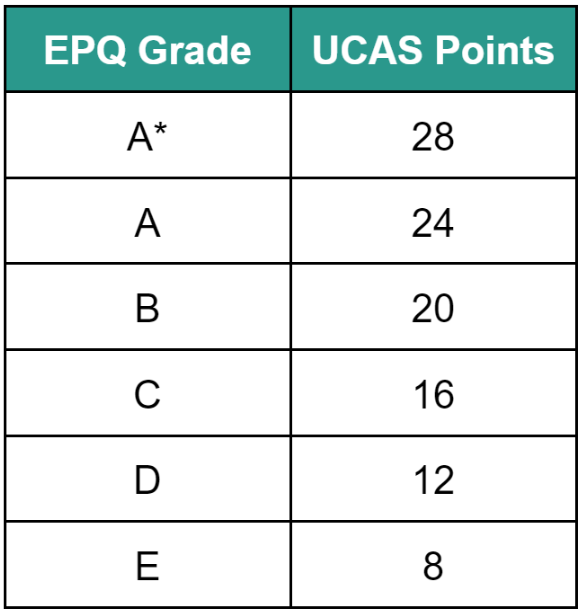
How is the EPQ assessed?
The EPQ is internally marked, which means your supervisor or another member of staff at your sixth form or college will grade it. A selection of EPQs from each institution will be randomly chosen for external moderation (i.e. their marking will be double checked by an external examiner). This process applies to all internally marked coursework.
The EPQ is marked according to four criteria:
- How well you organise and manage your time
- How effectively you use resources, conduct research, and analyse data
- How you develop an idea and achieve your goals
- How you evaluate and present your project
The total number of marks on offer varies across exam boards.

Is it hard to get an A* in the EPQ?
Compared to A Levels, it’s easier to achieve a high grade in the EPQ, with around 50% of students achieving an A* or A.
The EPQ requires dedication, meticulous research and planning, excellent time management, and the ability to present findings in a clear and compelling manner.
Success in the EPQ is often a reflection of a student’s commitment to the project. If you have a strong work ethic and a passion for your chosen topic, there’s no reason why you shouldn’t succeed.
What skills will you develop when doing the EPQ?
Taking the EPQ can help you cultivate a diverse skill set useful in higher education and the professional world.
According to AQA (the exam board that runs the EPQ for the majority of students), the EPQ enables students to:
- Become more critical, reflective and independent learners
- Develop and apply decision-making and problem-solving skills
- Increase planning, research, analysis, synthesis, evaluation and presentation skills
- Learn to apply technologies confidently
- Demonstrate creativity, initiative and enterprise

Do universities like the EPQ?
Universities recognise the value of the EPQ and its ability to develop the research and academic skills of students.
Depending on the university and course, some students who undertake the EPQ may receive reduced entry requirements. For example, while the standard offer for a course at the University of Bristol may be AAA at A Level, some admissions tutors may make an alternative offer of AAB and success in the EPQ.
While the EPQ may not impact their offers, Oxbridge see the EPQ as a valuable addition to a student’s university application. The University of Oxford “recognises that the EPQ will provide an applicant with the opportunity to develop research and academic skills relevant for study at Oxford” and encourages students to “draw upon their experience of undertaking the project when writing their personal statement.”
Should you do an EPQ?
There are tons of benefits to taking the EPQ.
If you’re thinking about attending university, doing an EPQ is an excellent way to develop your academic research and writing skills. You’ll get to focus on a topic of your choice, which is similar to what you will do when writing your dissertation at the end of your degree.
Completing an EPQ will also enhance your time management and communication skills. You will learn how to organise your work schedule and set deadlines and goals for yourself, rather than relying on a teacher to do it for you. These skills will be beneficial when revising for your A Level exams, and will serve you well during any STEM degree or career.

It is important to consider the significant time commitment (roughly 120 hours) required to complete the EPQ. You will need to seriously consider whether you can handle the additional workload alongside your other studies and extracurricular commitments.
Since much of your time and effort will be self-directed, you can always adjust your approach or find ways to minimise your workload if things get overwhelming. Don’t rule out doing an EPQ, but take steps to manage your time effectively, and seek guidance from your teacher or supervisor.
Can you do the EPQ if you’re already taking four A Levels?
Whether you can take the EPQ alongside four A Levels will be at the discretion of your sixth form or college. It certainly can be done, but there’s a huge amount of work involved.
Sitting four A Levels is more than enough to get into a good university, so don’t feel pressured to take on the EPQ.
However, if you’re adamant on pursuing the EPQ, discuss it with your school or college. They may be able to make some adjustments to your timetable and deadlines to make the workload more manageable.
EPQ advice
Embarking on an EPQ in STEM? Here’s advice straight from students who’ve been there!
What topic did you choose for your EPQ and why?
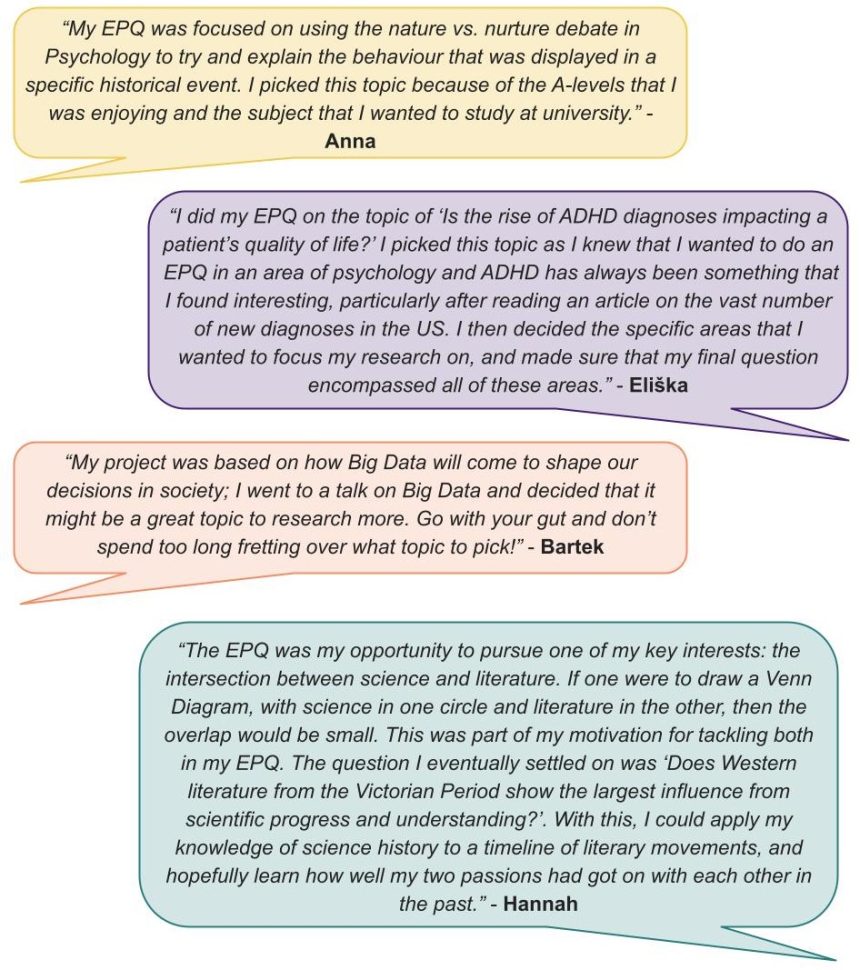
How did you find working with your EPQ supervisor?
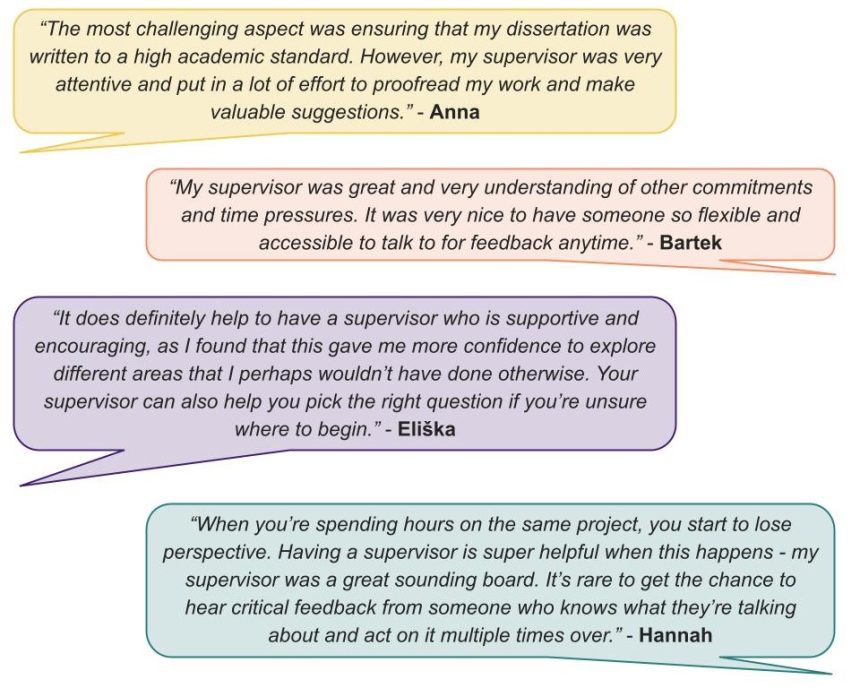
How did you juggle the EPQ with your other studies?
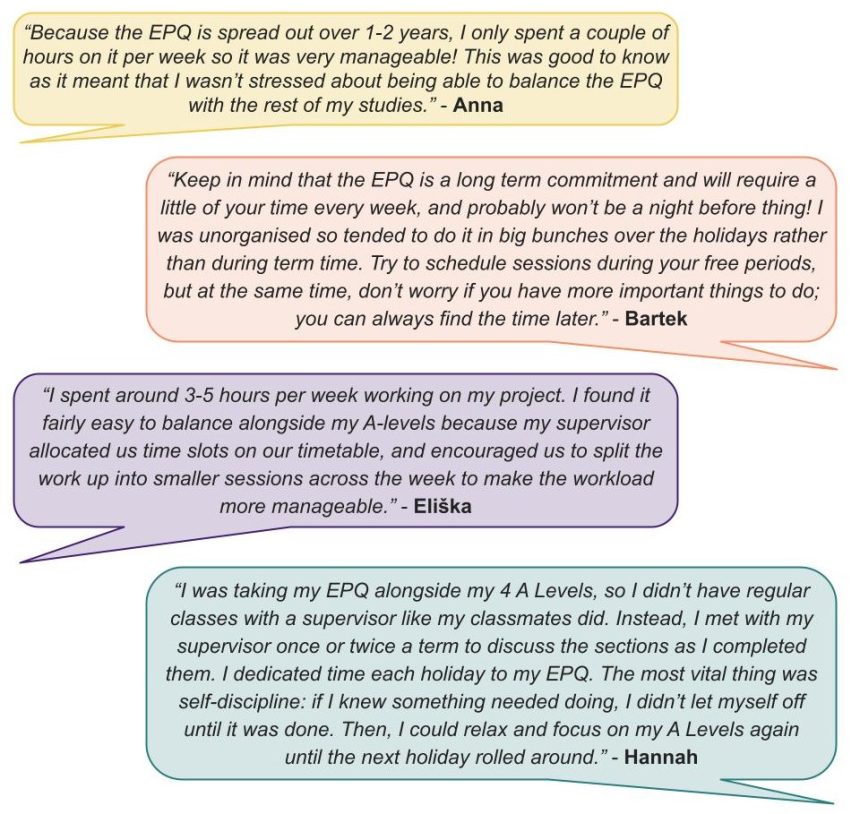
How did the EPQ benefit you?
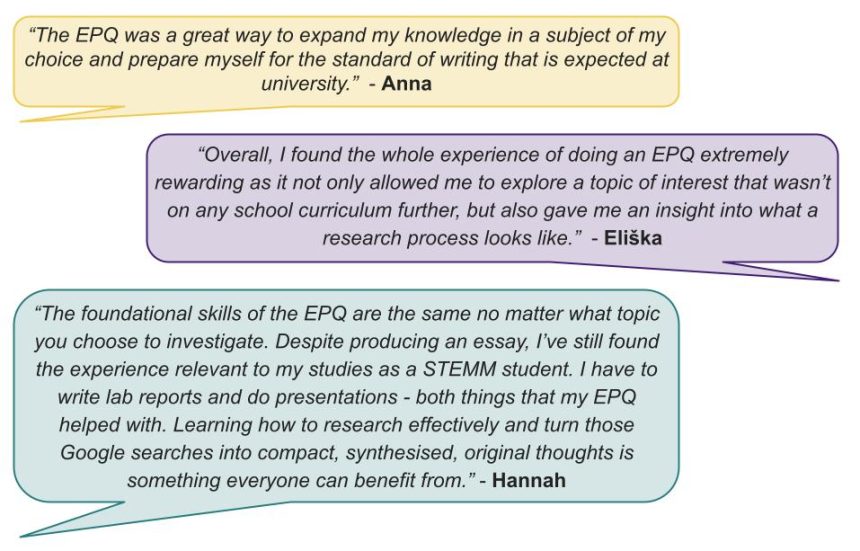
What tips do you have for other students taking the EPQ?
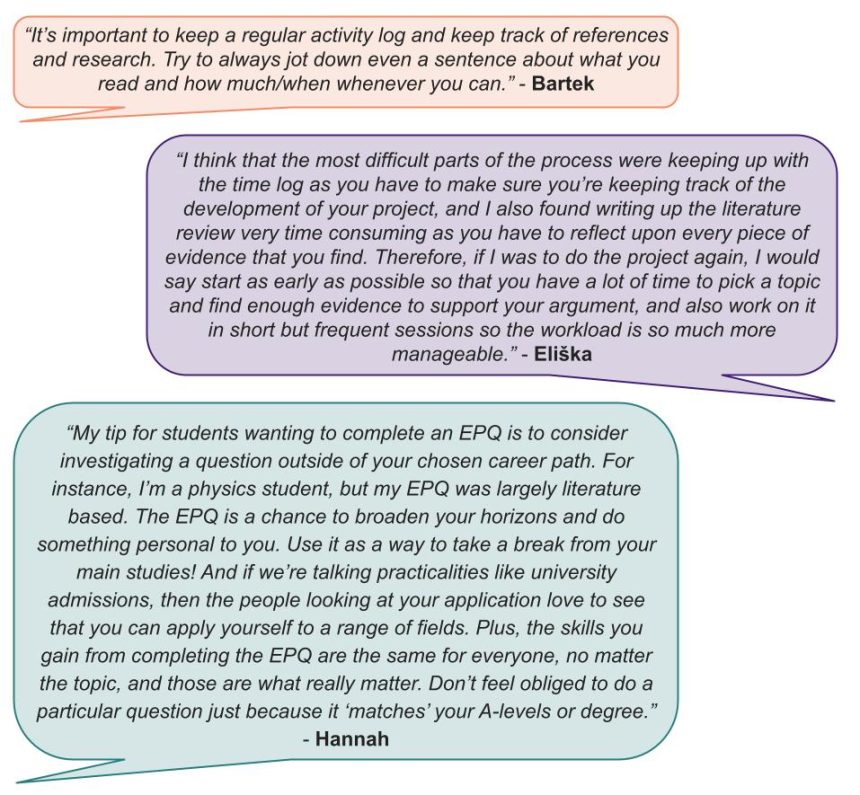


Comments